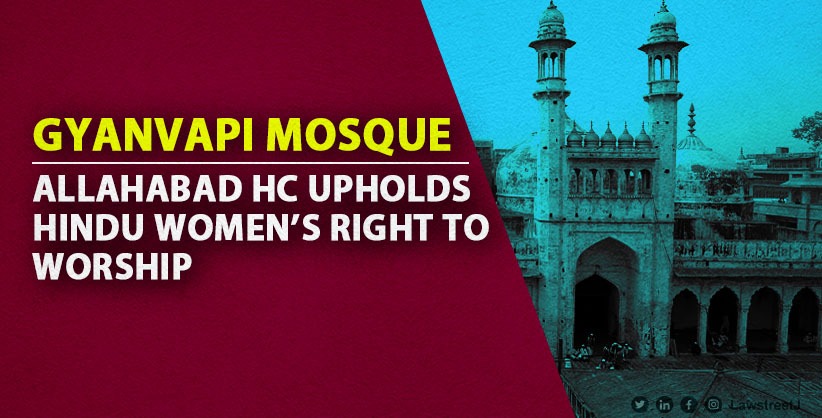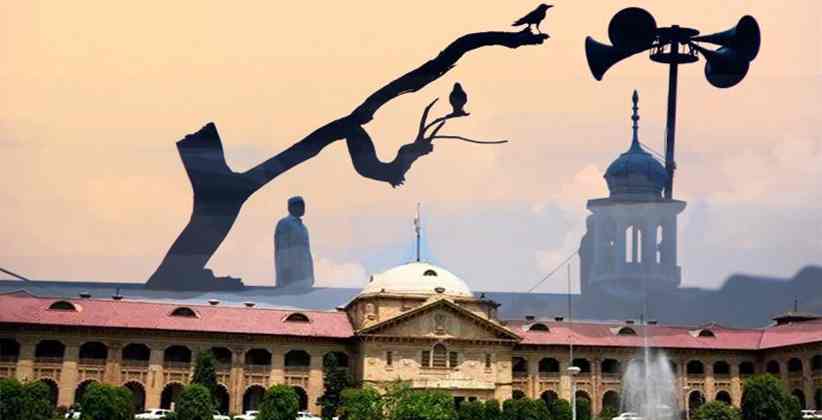The Allahabad High Court on Wednesday upheld the Varanasi District court's September 12, 2022 order on maintainability of a suit filed by a group of Hindu women for daily worship of deities and idols, located at the Gyanvapi mosque.
The district court had also held that the suit filed by the women was not barred by the Places of Worship (Special Provisions) Act, 1991, related to maintaining status of religious places as prevailed on August 15, 1947.
On Wednesday, the High Court rejected a revision petition filed by the Muslims side led by the Committee of Management of Anjuman Intejamia Masjid Varanasi, in a decision which is seen as a big win for the Hindu side.
A bench of Justice J J Munir passed the order, which was reserved in December, 2022.
By the order on September 12, 2022, District Judge A K Vishvesh had declared the court would continue to hear the petition seeking the right to worship in the temple.
"The plaintiffs are claiming only right to worship at the disputed property. They want to worship Maa Sringar Gauri and other visible and invisible deities with the contention that they worshipped there till the year 1993 and the plaintiffs are not claiming ownership over the disputed property. They have also not filed the suit for declaration that the disputed property is a temple," it had said.
A group of five women represented by Hari Shankar Jain and Vishnu Shankar Jain and others filed the petition seeking permission for daily worship of Hindu deities.
The Anjuman Intezamia Masjid Committee has said the Gyanvapi mosque is a Waqf property and has questioned the maintainability of the plea.
In its detailed order, the court had noted according to the pleadings of the plaintiffs, they were worshipping Maa Sringar Gauri, Lord Hanuman, Lord Ganesh at the disputed place incessantly since a long time till 1993.
"After 1993, they were allowed to worship the Gods only once in a year under the regulatory of State of Uttar Pradesh. Thus, according to plaintiffs, they worshipped Maa Sringar Gauri, Lord Hanuman at the disputed place regularly even after 15th August, 1947. Therefore, The Places of Worship (Special Provisions) Act, 1991 does not operate as bar on the suit of the plaintiffs and the suit of plaintiffs is not barred by Section 9 of the Act," the court said.
With regard to another contention whether the suit of the plaintiffs is barred by Section 85 of the Waqf Act 1995, the court concluded "the provision does not operate in the present case because the plaintiffs are non-Muslims and strangers to the alleged Waqf created at the disputed property".
The court, which also framed a question whether the suit of the plaintiffs is barred by the Uttar Pradesh Sri Kashi Vishwanath Temple Act, 1983, held no bar has been imposed by this law with regard to a suit claiming right to worship idols installed in the endowment within the premises of the temple, or outside.
On May 20, 2022, the Supreme Court has transferred the proceedings of the suit by Hindu parties seeking worshipping rights at the Gynavapi mosque to the district judge in Varanasi.
However, the court had then said its May 17 interim order directing protection of the 'Shivling', and free access to Muslims to the site for offering namaz should remain operational.
A 'Shivlingam' was found in May, 2022 during the survey by the court commissioner within the mosque complex, where the Muslims used to do 'vaju' (ablution) before namaz.








!["No Loudspeakers For Azan, No Fundamental Right To Create Noise," Says Allahabad HC To Two Mosques [Read Judgment]](/secure/uploads/2020/01/lj_4995_Allahabad_HC_AZAN.jpg)








